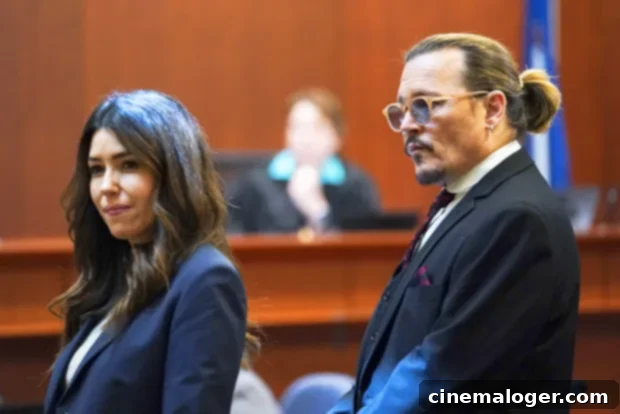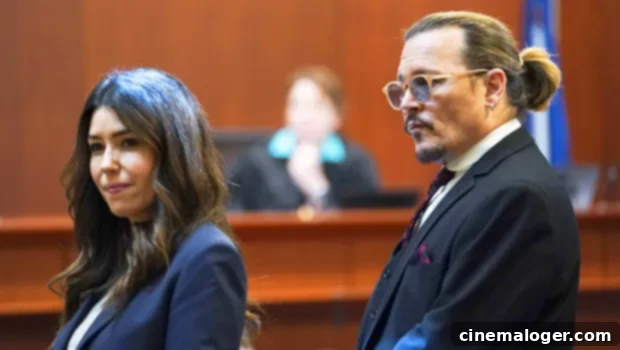Camille Vasquez Addresses Johnny Depp Romance Rumors: Ethics, Professionalism, and the Truth Amidst the Defamation Trial
During one of the most high-profile and publicly scrutinized legal battles in recent memory, attorney Camille Vasquez rose to unexpected global prominence. As a key member of Johnny Depp’s legal team in his defamation lawsuit against ex-wife Amber Heard, Vasquez captivated audiences with her sharp cross-examination skills and unwavering professionalism. However, her sudden visibility inadvertently sparked a wildfire of speculation, igniting rumors across social media platforms that she and her client, Johnny Depp, had developed a secret romance. These pervasive whispers quickly became a significant talking point, overshadowing at times the intricate legal proceedings themselves.
Camille Vasquez, who became an internet sensation and a viral star throughout the intensely watched trial, directly confronted and emphatically shut down these unfounded rumors. In an exclusive interview with People magazine, published on Thursday, June 9, Vasquez addressed the widespread speculation head-on, clarifying the nature of her relationship with the acclaimed actor. She made it unequivocally clear that there was no romantic involvement, describing such suggestions as not only false but also deeply offensive and professionally inappropriate.
Her denial was rooted in multiple, compelling reasons. Foremost among them, Vasquez revealed she is in a “very happy” and committed relationship, a fact that directly contradicted the narrative of a blossoming romance with her client. Beyond her personal life, she emphasized the strict ethical boundaries that govern the legal profession. Dating a client, she explained, is fundamentally “unethical” and goes against the core principles of professional conduct that all attorneys are bound by. This ethical consideration served as a robust barrier against any potential romantic entanglement, underscoring her commitment to her professional duties.
Vasquez elaborated on her feelings regarding the rumors, expressing profound disappointment and finding the speculation to be deeply offensive on multiple levels. “It’s also an unethical charge being made. It’s sexist,” she told People, highlighting the problematic nature of the assumptions. She articulated that the insinuations were not just personally insulting but also undermined the serious work she was doing. This sentiment speaks to a broader issue: the tendency to sexualize professional interactions, especially when a successful woman is involved in a high-profile case. While admitting she wasn’t entirely surprised by the “territory” that comes with public exposure, the sexist undertones of the rumors clearly struck a nerve, suggesting a devaluing of her professional achievements in favor of a sensationalized personal narrative.
The intensity of the defamation trial, coupled with the unprecedented level of social media engagement, created fertile ground for such speculation. Millions watched as clips of Vasquez interacting with Depp went viral on TikTok and other platforms. Self-proclaimed “body language experts” and amateur internet sleuths meticulously dissected every glance, smile, and gesture shared between the lawyer and her client, interpreting professional rapport and strategic legal teamwork as signs of a burgeoning romantic connection. Hashtags like #JusticeForJohnny and #CamilleAndJohnny quickly amassed billions of views, propagating the dating rumors and fueling a romantic fantasy that captivated many online users. This digital fervor often blurred the lines between genuine interest in the legal proceedings and a desire for a dramatic, off-screen romance.
However, reports from more traditional media outlets quickly worked to debunk these sensationalized claims. For instance, a report from TMZ clarified that the supposed “chemistry” between Johnny Depp and his legal team, including Vasquez, was simply a reflection of their strong professional camaraderie and genuine enjoyment of each other’s company during a long, stressful, and emotionally taxing trial. The legal team’s unified front and supportive dynamic were crucial to their success, and any interpretation beyond professional respect was largely a product of public imagination. Further solidifying the truth, Camille Vasquez was photographed after the trial’s conclusion departing her hotel with her actual boyfriend, providing concrete visual evidence that the romance rumors were baseless and definitively putting an end to the widespread speculation.
Beyond the ethical and personal affront, Vasquez expressed frustration regarding how her professional relationship with Johnny Depp was misrepresented and sensationalized by certain outlets. “It’s disappointing that certain outlets kind of ran with it or said that my interactions with Johnny — who is a friend and I’ve known and represented for four-and-a-half years now — that my interactions in any way were inappropriate or unprofessional,” she stated. This sentiment underscores the challenge many public figures face when their professional lives are intensely scrutinized, and every interaction is subject to misinterpretation. It also highlights the disservice such rumors do to the diligent and demanding work undertaken by legal professionals, especially in high-stakes cases.

It is crucial to remember the context of Vasquez’s unexpected rise to fame: her exceptional performance as part of the legal team that successfully represented Johnny Depp. The jury in the Fairfax County, Virginia, courtroom found that Amber Heard had defamed the Pirates of the Caribbean star in a 2018 op-ed published by The Washington Post, in which she described herself as a “public figure representing domestic abuse.” This landmark verdict awarded Johnny Depp $10 million in compensatory damages and an additional $5 million in punitive damages (though the punitive damages were later capped at $350,000 under Virginia law). Vasquez’s rigorous cross-examination of Heard was widely credited as a pivotal moment in the trial, solidifying her reputation as a formidable and highly effective attorney. This professional triumph, however, was partially overshadowed by the persistent and distracting romance rumors.
The aftermath of the trial also saw further legal discussions. While the jury awarded Depp a significant monetary sum, his co-counsel, attorney Ben Chew, hinted in interviews after the trial’s conclusion that Depp might not actively pursue the monetary damages from Heard. Chew suggested that for Depp, the lawsuit was primarily about clearing his name and restoring his reputation, not about financial gain. This perspective further emphasizes the gravity of the legal fight and the high stakes involved, making the trivialization of Vasquez’s professional contributions through romance rumors all the more regrettable.
The phenomenon surrounding Camille Vasquez and Johnny Depp serves as a vivid illustration of the intense public scrutiny that accompanies high-profile legal cases, especially when celebrity figures are involved. It highlights how the boundary between professional conduct and personal life can become dangerously blurred in the age of instant media and viral social media speculation. Vasquez’s firm and eloquent rebuttal to the dating rumors underscores not only her commitment to legal ethics and her personal relationship but also her dedication to preserving the integrity of her profession. Her experience is a powerful reminder of the importance of focusing on merit and facts rather than sensationalized narratives, allowing professionals like Vasquez to be recognized for their skills and achievements rather than for fabricated personal sagas.
Ultimately, Camille Vasquez’s stance is a testament to professionalism and integrity. By directly addressing and refuting the romance rumors, she reaffirmed her commitment to the ethical principles of her profession and reinforced the genuine, albeit professional, bond she shared with her client. It calls upon the public and media alike to respect the boundaries of professional relationships and to acknowledge the serious and demanding work of individuals involved in legal proceedings, without resorting to speculative and often sexist narratives that detract from their true contributions.
